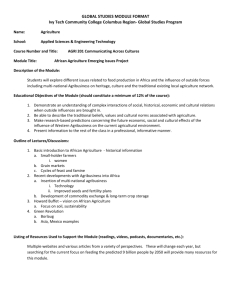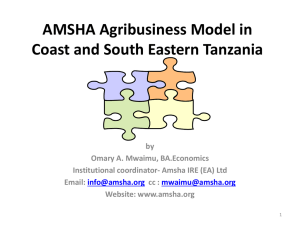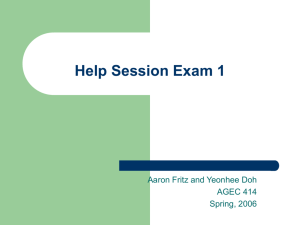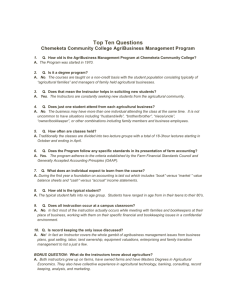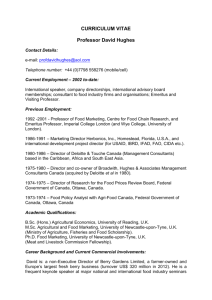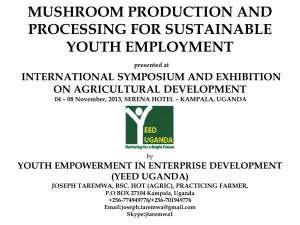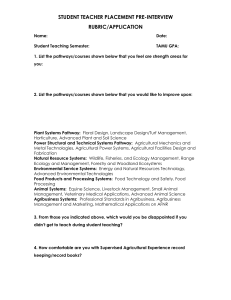ILOs: Learning and Evaluation Methods
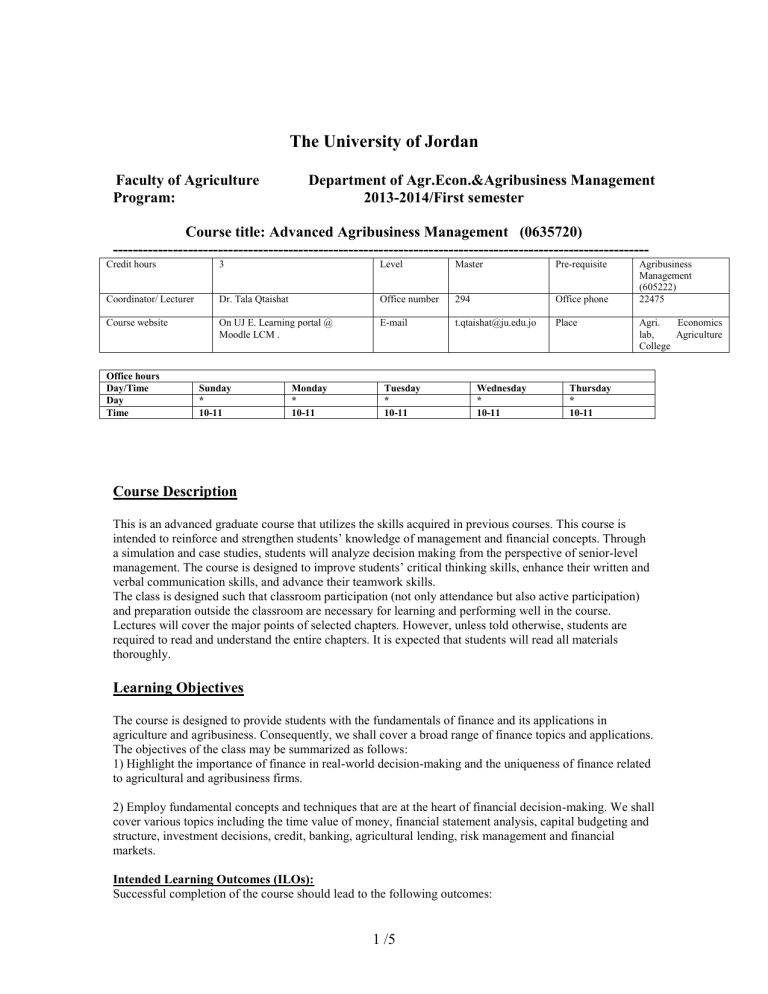
The University of Jordan
Faculty of Agriculture Department of Agr.Econ.&Agribusiness Management
Program: 2013-2014/First semester
Course title: Advanced Agribusiness Management (0635720)
-----------------------------------------------------------------------------------------------------------
Credit hours 3 Level Master Pre-requisite Agribusiness
Management
(605222)
Dr. Tala Qtaishat Office number 294 Office phone 22475 Coordinator/ Lecturer
Course website On UJ E. Learning portal @
Moodle LCM .
E-mail t.qtaishat@ju.edu.jo Place Agri. Economics lab, Agriculture
College
Office hours
Day/Time
Day
Time
Sunday
*
10-11
Monday
*
10-11
Tuesday
*
10-11
Wednesday
*
10-11
Thursday
*
10-11
Course Description
This is an advanced graduate course that utilizes the skills acquired in previous courses. This course is intended to reinforce and strengthen students’ knowledge of management and financial concepts. Through a simulation and case studies, students will analyze decision making from the perspective of senior-level management. The course is designed to improve students’ critical thinking skills, enhance their written and verbal communication skills, and advance their teamwork skills.
The class is designed such that classroom participation (not only attendance but also active participation) and preparation outside the classroom are necessary for learning and performing well in the course.
Lectures will cover the major points of selected chapters. However, unless told otherwise, students are required to read and understand the entire chapters. It is expected that students will read all materials thoroughly.
Learning Objectives
The course is designed to provide students with the fundamentals of finance and its applications in agriculture and agribusiness. Consequently, we shall cover a broad range of finance topics and applications.
The objectives of the class may be summarized as follows:
1) Highlight the importance of finance in real-world decision-making and the uniqueness of finance related to agricultural and agribusiness firms.
2) Employ fundamental concepts and techniques that are at the heart of financial decision-making. We shall cover various topics including the time value of money, financial statement analysis, capital budgeting and structure, investment decisions, credit, banking, agricultural lending, risk management and financial markets.
Intended Learning Outcomes (ILOs):
Successful completion of the course should lead to the following outcomes:
1 /5
A.
Knowledge and Understanding: Student is expected to
A1- Gain student information to agribusiness management and Agribusiness system .
A2- Demonstrate basic knowledge on the five functions of management.
A3Understand external and internal factors, which are influencing agribusiness management successfully.
A4 gain information about the characteristics of a professional manger.
B. Intellectual Analytical and Cognitive Skills: Student is expected to
B1 - Practical strategy how to maintain a good quality of agribusiness management.
B2 -Know about the balance sheet and income statement to evaluate the financial situation of agribusiness.
B3 -Suggest improvements for liquidity, solvency, profitability, turnover, and market-to-book ratios using food and agricultural firms’ financial statements;
C. Subject- Specific Skills: Students is expected to
C1 - Be able to assess the performance of various business disciplines
C2 -.Make recommendations for improvements
C3 - Assess the firm’s performance on several dimensions
C4 - Make a decision regarding a food or agricultural business loan application using the five C’s of credit;
D. Transferable Key Skills: Students is expected to
D1 Develop written documents that effectively and persuasively communicate a stance regarding a food or agricultural business decision;
D2 Work in teams to create an effective oral and written presentation for communicating a suggested strategy or decision for a food or agricultural firm.
.
ILOs: Learning and Evaluation Methods
ILO/s Learning Methods
A . Knowledge and
Understanding
( A1-A4 )
B . Intellectual
Analytical and
Cognitive
Skills ( B1-B3 )
C . Subject
Specific Skills
( C1-C4 )
D .Transferable
Key Skills
( D1-D2 )
Lectures and Discussions
Lectures and Discussions
Lectures and Discussions
Project & presentation
Evaluation Methods
Exam, Quiz,
Exam, Quiz,
Exam, Quiz,
Project & presentation evaluation.
2 /5
Course Contents
Week Subject
(lst wk)
Introductions, Administration and
Expectations; Business Writing Basics;
Avoiding Plagiarism
(2 nd wk)
(3 rd wk)
4th wk
( 5 th wk)
(6 th wk)
7 th wk
(8 th
and
9 th wk)
10 th
wk
(11 wk)
Introduction:
Planning:
Marketing
Forecasting
Budgeting
Organizing:
management
Case Study
(Individual work) discussion
Controlling function in decision making process
Supervising:
Course overview; the agribusiness system, Five functions of Agribusiness
Choosing a business type
Cooperative Business Structures
Case Study discussion (Team
work group)
Business Types
Managing and Supervising
Employees
Managing a Successful
Agribusiness
Midterm Exam
Evaluation:
Holistic evaluation of an agribusiness
Sources
Read the Syllabus Read
AACU Poll of
Employers Report Read
“Dr. Kropp’s Writing
Pet Peeves”
Chapter 1 , 2 &3 in
Walter David Downey,
John K. Trocke, 1981,
Agribusiness
Management
Read assigned case study and discuss it
Chapter 4 , 5 and 6 in
Walter David Downey,
John K. Trocke, 1981,
Agribusiness
Management
Chapter 7 and 8 in
Walter David Downey,
John K. Trocke, 1981,
Agribusiness
Management
Each student will read and analysis assigned case and discuss it
Chapter 9 in Walter
David Downey, John K.
Trocke, 1981,
Agribusiness
Management
Chapter 10 and 11 in
Walter David Downey,
John K. Trocke, 1981,
Agribusiness
Management
15/11/2013
Chapter 12 in Walter
David Downey, John K.
Trocke, 1981,
Agribusiness
Management
ILOs
D-1 and D-2
A-1, A-2 A-3 A-4
D-1 and D-2
B-1, B-2 and B-3
C-1 and C-2
D-1 and D-2
C-3 and C-4
A-2, B-1, C-1,
D-1, D-2,
A-3,B-2,C-1,C-2,
C-4, D-1, D-2
3 /5
(12 and
13 wk )
14 , 15 and 16 wk
Government regulations which can affect on starting of a new agribusiness
Read Agriculture ministry regulations
Project Discussion Student prepare their own power points
C3, c-4 and D-2
D-1 and D-2
Learning Methodology
The course will be structured in lectures, discussions, theoretical and practical exercises and excursions.
The course comprises overviews, from general understanding to expert knowledge on key topics, and learning is based on lectures as well as independent learning through exercises, excursions and a final project work.
Evaluation
Evaluation Point % Date
Midterm Exam
Case Study Discussion
Project
Final Exam
25%
15%
10%
50%
15/11/2013
Assigned by instructor
From 10/12/2013-29/12/2013
Will be announcing from registration office.
Main Reference/s:
1- Walter David Downey, John K. Trocke, 1981, Agribusiness Management , IL:
Waveland Press.
2- A series of case studies that can be purchased
3- Thompson, et. al., The Business Strategy Game, Online Edition, McGraw-Hill Irwin
($42.95 plus applicable sales taxes).
4- Ross, Stephen A., Randolph W. Westerfield, and Bradford D. Jordan, Essentials of
Corporate Finance , Seventh Edition, 2010, McGraw-Hill/Irwin. ISBN:
9780077405335 (RWJ)
5- Financial Calculator: Students are responsible for learning how to use their particular calculator. Class time will not be devoted to this purpose . Suggested models: Hewlett-Packard HP-10BII or Texas Instruments BAII Plus
Other Useful Texts:
1- Barry, Ellinger, Hopkin, and Baker, Financial Management in Agriculture, sixth edition, Interstate Publishers, Inc., Danville, IL, 2000.
2- Subramanyam, K. R. and J. J. Wild. 2009. Financial Statement Analysis, tenth edition, McGraw-Hill Irwin. ISBN-13: 9780073379432.
4 /5
Intended Grading Scale (Optional)
64
67
73
76
79
85
From (%)
0
45
48
55
61
66
72
75
78
84
87
To (%)
44
47
54
60
63
2
2.5
2.75
3
3.5
3.75
Scale
0
0.75
1
1.5
1.75
C
C+
B-
B
B+
A ¯
A
Mark
H
D-
D
D+
C-
Result
Fail
Fail
Accepted
Accepted
Good
Good
Good
Very Good
Very Good
Very Good
Excellent
Excellent 88 100 4
Notes:
Concerns or complaints should be expressed in the first instance to the module lecturer; if no resolution is forthcoming, then the issue should be brought to the attention of the module coordinator (for multiple sections) who will take the concerns to the module representative meeting. Thereafter, problems are dealt with by the
Department Chair and if still unresolved the Dean and then ultimately the Vice
President. For final complaints, there will be a committee to review grading the final exam.
For more details on University regulations please visit: http://www.ju.edu.jo/rules/index.htm
5 /5
